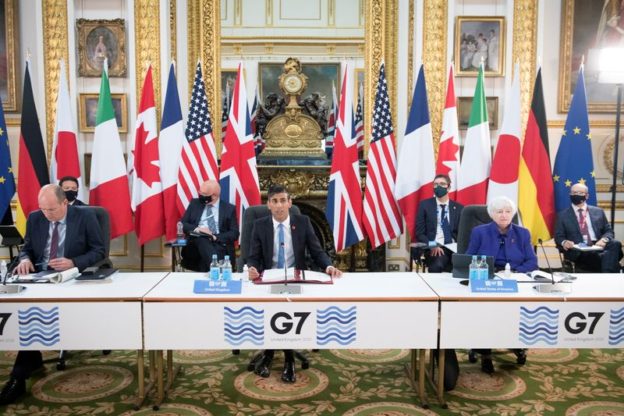The accord, which could form the basis of a global pact next month, is aimed at ending a decades-long “race to the bottom” in which countries have competed to attract corporate giants with ultra-low tax rates and exemptions.
The United States, Britain and other large, rich nations reached a landmark deal on Saturday to squeeze more money out of multinational companies such as Amazon and Google and reduce their incentive to shift profits to low-tax offshore havens.
Hundreds of billions of dollars could flow into the coffers of governments left cash-strapped by the COVID-19 pandemic after the Group of Seven (G7) advanced economies agreed to back a minimum global corporate tax rate of at least 15%.
Facebook said it expected it would have to pay more tax, in more countries, as a result of the deal, which comes after eight years of talks that gained fresh impetus in recent months after proposals from U.S. President Joe Biden’s new administration.
“G7 finance ministers have reached a historic agreement to reform the global tax system to make it fit for the global digital age,” British finance minister Rishi Sunak said after chairing a two-day meeting in London.
The meeting, hosted at an ornate 19th-century mansion near Buckingham Palace in central London, was the first time finance ministers have met face-to-face since the start of the pandemic.
U.S. Treasury Secretary Janet Yellen said the “significant, unprecedented commitment” would end what she called a race to the bottom on global taxation.
German finance minister Olaf Scholz said the deal was “bad news for tax havens around the world”.
Yellen also saw the G7 meeting as marking a return to multilateralism under Biden and a contrast to the approach of U.S. President Donald Trump, who alienated many U.S. allies.
“What I’ve seen during my time at this G7 is deep collaboration and a desire to coordinate and address a much broader range of global problems,” she said.
Ministers also agreed to move towards making companies declare their environmental impact in a more standard way so investors can decided more easily whether to fund them, a key goal for Britain.
TAXING TIMES
Current global tax rules date back to the 1920s and struggle with multinational tech giants that sell services remotely and attribute much of their profits to intellectual property held in low-tax jurisdictions.
https://cfo.economictimes.indiatimes.com/news/tech-giants-and-tax-havens-targeted-by-historic-g7-deal/83281655





